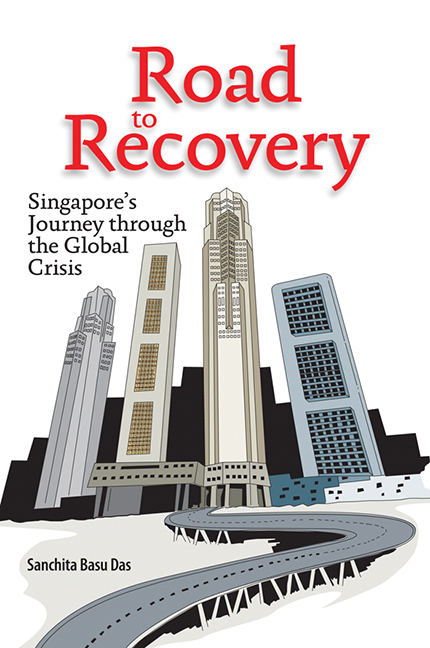Book contents
- Frontmatter
- Dedication
- Contents
- List of Tables
- List of Figures
- List of Boxes
- Foreword
- Acknowledgements
- Abbreviations
- 1 Introduction
- 2 Global Financial and Economic Crisis: Causes, Impact, and Policy Response
- 3 Impact of Global Economic Crisis on Singapore
- 4 Singapore's Policy Responses to the Global Economic Crisis
- 5 Singapore Economic Perspective and Future Policy Directions
- 6 Lessons Learnt
- Appendix I MAS Monetary Policy Statements
- Appendix II Key Budget FY2009 Initiatives
- Appendix III Summary of the ESC Key Recommendations
- Appendix IV Key Budget FY2010 Initiatives
- References
- Index
- About the Author
Appendix III - Summary of the ESC Key Recommendations
Published online by Cambridge University Press: 21 October 2015
- Frontmatter
- Dedication
- Contents
- List of Tables
- List of Figures
- List of Boxes
- Foreword
- Acknowledgements
- Abbreviations
- 1 Introduction
- 2 Global Financial and Economic Crisis: Causes, Impact, and Policy Response
- 3 Impact of Global Economic Crisis on Singapore
- 4 Singapore's Policy Responses to the Global Economic Crisis
- 5 Singapore Economic Perspective and Future Policy Directions
- 6 Lessons Learnt
- Appendix I MAS Monetary Policy Statements
- Appendix II Key Budget FY2009 Initiatives
- Appendix III Summary of the ESC Key Recommendations
- Appendix IV Key Budget FY2010 Initiatives
- References
- Index
- About the Author
Summary
High-skilled People, Innovative Economy, Distinctive Global City
We must make skills, innovation and productivity the basis for sustaining Singapore's economic growth. This will also provide for inclusive growth, with a broad- based increase in the incomes of our citizens.
We must also be a vibrant and distinctive global city — open and diverse, the best place to grow and reach out to a rising Asia, and a home that provides an outstanding quality of life for our people.
ESC Key Recommendations
We must achieve higher productivity growth of 2 to 3 per cent per year, enabling our GDP to grow on average by 3 to 5 per cent per year over the next decade.
Increased productivity is not achieved merely through increased efficiency, but restructuring our economy to provide more room for rapidly growing and innovative enterprises.
7 Key Strategies
1. Growing through skills and innovation
a. High-level national council to oversee and drive efforts to boost productivity and expand CET (Continuing Education and Training) to ensure national level coordination of government agencies and close collaboration between public and private sectors.
b. Encourage enterprise innovation and investments in technology and training, both through broad- based and targeted sectoral approaches.
• Introduce strong economy-wide fiscal incentives for companies to invest in productivity enhancement and innovation.
• Set up a National Productivity Fund to provide grants to support industry-focused and enterprise-level productivity initiatives at the sectoral level.
c. Upskill workers at all levels through enhanced CET system.
• Multiple skills-based progression pathways to complement academic route.
• Reach out to more PMETs.
d. Strengthen support for low-wage workers through enhanced Workfare Income Supplement (WIS) scheme, and additional support for training.
e. Manage our dependence on the foreign workforce by raising foreign worker levies in a gradual and phased manner.
- Type
- Chapter
- Information
- Road to RecoverySingapore's Journey through the Global Crisis, pp. 181 - 189Publisher: ISEAS–Yusof Ishak InstitutePrint publication year: 2010

